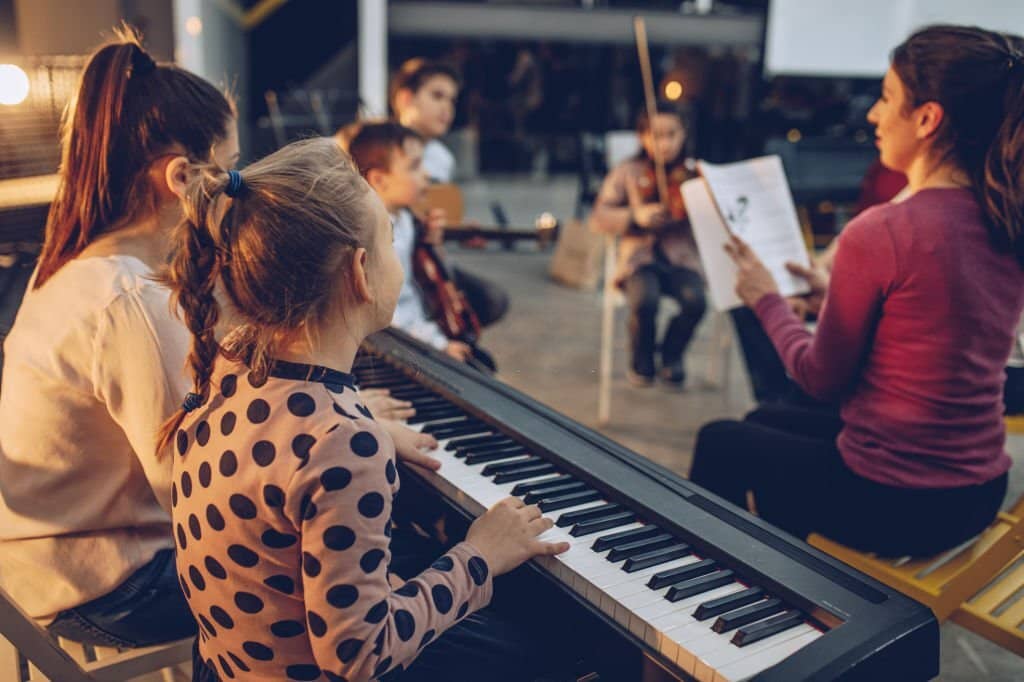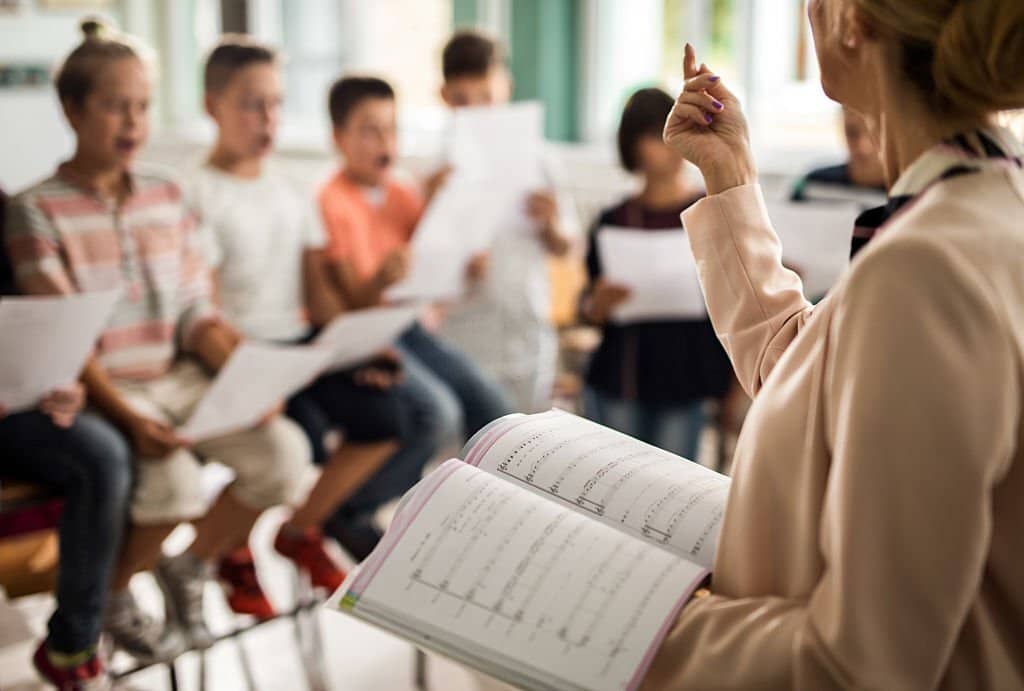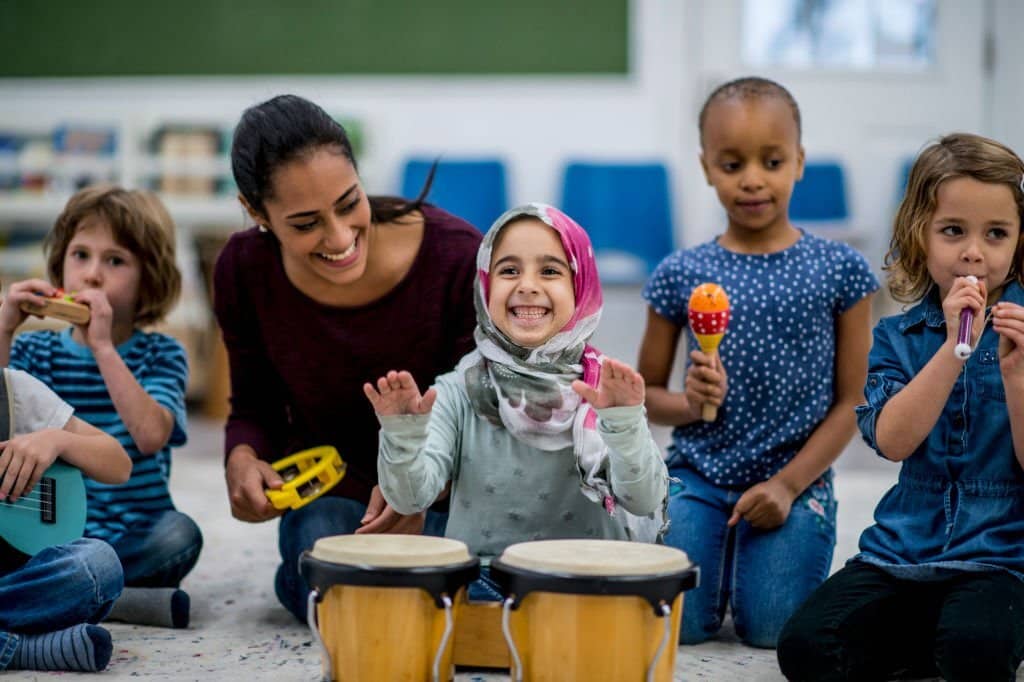Music Education for Kids: The Benefits of Music Education
Introduction
The world of music offers a myriad of benefits for children, making music education an essential part of their development.
Music Education for Kids provides a unique opportunity for children to explore and engage with the world of melodies, rhythms, and harmonies.
1.1 Importance of music education for children
Music education for kids plays a crucial role in their overall growth and development.
It goes beyond teaching them to play instruments or sing; it encompasses a wide range of benefits that shape their cognitive, emotional, social, and physical well-being.
By engaging in music education, children have the opportunity to enhance their language skills, boost their memory and cognitive function, and develop improved mathematical abilities.
Moreover, music education allows children to express their emotions, fostering empathy and emotional intelligence.
It provides a channel for stress reduction and relaxation, giving children a means to unwind and find solace in the power of music.
1.2 Definition of music education
Music education involves the systematic and intentional instruction of musical concepts and skills to children.
It encompasses various aspects, such as learning to play instruments, singing, music theory, music history, and ensemble participation.
Music education for kids aims to develop their musical abilities, enhance their understanding and appreciation of different musical styles and genres, and foster their creativity and self-expression.
It often includes structured lessons, ensemble rehearsals, performances, and opportunities to collaborate with peers.
By providing a well-rounded music education, children can develop a lifelong love and appreciation for music while reaping the numerous cognitive, emotional, and social benefits it offers.
2. Cognitive Development

Music Education for Kids plays a significant role in fostering cognitive development, enhancing various aspects of a child’s mental abilities.
2.1 Improved language skills
Engaging in music education helps children develop improved language skills.
Through singing, listening to lyrics, and learning to read and interpret musical notation, children strengthen their vocabulary, phonemic awareness, and pronunciation.
Music education also promotes the understanding of rhythm and melodic patterns, which can enhance language comprehension and expression.
Research suggests that children exposed to music education demonstrate enhanced verbal communication skills, better reading abilities, and an increased aptitude for learning foreign languages.
2.2 Enhanced mathematical abilities
Music and mathematics share a deep connection, and music education can positively impact a child’s mathematical abilities.
The rhythmic and temporal aspects of music require understanding and applying mathematical concepts such as counting, patterns, fractions, and proportions.
By learning to read musical notation, children develop skills in recognizing patterns, sequencing, and problem-solving, which are fundamental to mathematical reasoning.
Studies have shown that children who receive music education often exhibit improved spatial-temporal skills, numerical proficiency, and logical thinking.
2.3 Boosted memory and cognitive function
Participating in music education can have a positive impact on a child’s memory and overall cognitive function.
Learning to play an instrument or memorizing musical pieces requires concentration, attention to detail, and repeated practice.
These activities strengthen memory recall and retention skills.
Additionally, engaging in music education stimulates multiple areas of the brain, promoting neural connections and cognitive development.
Research suggests that children involved in music education tend to have better working memory, attention span, and overall cognitive abilities, which can transfer to other academic subjects and daily life activities.
3. Emotional Development
Music Education for Kids plays a crucial role in fostering emotional development, offering children a platform to express emotions, develop empathy, and find solace in stress reduction and relaxation.
3.1 Expression of emotions through music
Music Education for Kids provides a safe and creative outlet for children to express their emotions.
Whether through singing, playing instruments, or listening to music, children can channel their feelings of joy, sadness, excitement, or calmness.
By engaging in music education, kids learn to connect with and communicate their emotions through the power of music, enabling them to develop healthy emotional expression and self-awareness.
3.2 Development of Empathy and emotional intelligence
Through Music Education for Kids, children have the opportunity to develop empathy and emotional intelligence.
As they actively listen to and interpret the emotions conveyed in music, they gain a deeper understanding of human feelings and perspectives.
Collaborative music-making experiences, such as ensemble performances or group improvisations, foster teamwork, cooperation, and mutual understanding.
By engaging in these activities, children learn to recognize and respond to the emotions of others, enhancing their capacity for empathy and social-emotional skills that extend beyond the realm of music.
3.3 Stress Reduction and Relaxation
Music Education for Kids serves as a powerful tool for stress reduction and relaxation.
Playing or listening to music has been shown to have therapeutic effects, helping children regulate their emotions and find solace during times of stress.
The soothing melodies and harmonies can create a calming atmosphere, allowing children to unwind and relax.
Moreover, music education teaches children relaxation techniques, such as deep breathing exercises and mindfulness practices, which they can utilize to manage stress and anxiety.
By incorporating music into their lives, children can experience the stress-relieving benefits of music, promoting emotional well-being and overall relaxation.
4. Social Development

Music Education for Kids plays a pivotal role in promoting social development, facilitating collaboration, enhancing self-confidence and self-esteem, and fostering the building of connections and friendships.
4.1 Collaboration and Teamwork through musical activities
Music Education for Kids provides numerous opportunities for collaboration and teamwork.
Engaging in group musical activities, such as ensemble performances, choir rehearsals, or band practices, enables children to work together harmoniously.
Through these collective musical experiences, Music Education for Kids cultivates collaboration, teaching children how to listen, communicate effectively, and coordinate their efforts with others.
These essential skills learned through Music Education for Kids, promote teamwork, compromise, cooperation, and leadership, which are transferable to various social contexts beyond music.
By emphasizing collaboration, Music Education for Kids nurtures a sense of unity and shared accomplishment among children.
4.2 Increased self-confidence and self-esteem
Music Education for Kids has a positive impact on self-confidence and self-esteem.
As children learn to play an instrument, sing, or perform in front of an audience, they experience a sense of achievement and personal growth.
With practice and dedication, they gain mastery over their musical abilities, leading to increased self-assurance.
Music education provides opportunities for children to showcase their talents, receive positive feedback, and gain recognition for their accomplishments, boosting their self-esteem and belief in their abilities.
4.3 Building Connections and Friendships
Music Education for Kids provides an exceptional platform for children to build connections and form lasting friendships.
By participating in collaborative musical experiences, such as ensemble performances, music camps, or community choirs, children are brought together with like-minded individuals who share a passion for music.
These shared experiences within Music Education for Kids create a strong sense of camaraderie and foster genuine connections.
The supportive environment and shared interests in Music Education for Kids facilitate the formation of friendships that extend beyond the musical realm.
Moreover, Music Education for Kids exposes children to diverse musical traditions, cultures, and perspectives, promoting inclusivity and expanding their social horizons.
5. Physical Development
Music Education for Kids not only nurtures cognitive and emotional development but also plays a significant role in fostering physical development.
Engaging in Music Education for Kids enhances fine motor skills, improves hand-eye coordination, and offers benefits for body movement and dance.
5.1 Fine motor skills enhancement
Music Education for Kids involves learning to play instruments that require precise finger movements, such as the piano, guitar, or violin.
By participating in Music Education for Kids, children develop and refine their fine motor skills.
Through the deliberate coordination of their fingers and hands, they gain dexterity, finger strength, and the ability to move their fingers independently.
These enhanced fine motor skills, cultivated through Music Education for Kids, extend beyond music and contribute to tasks like writing, drawing, and other activities that require intricate finger movements.
5.2 Hand-eye coordination improvement
Music Education for Kids significantly contributes to the improvement of hand-eye coordination.
Playing musical instruments or engaging in rhythmic activities within Music Education for Kids requires the synchronization of hand movements with visual cues.
For instance, drumming necessitates precise hand-eye coordination to strike the correct drum at the right time.
Similarly, reading sheet music and playing an instrument simultaneously demand accurate hand-eye coordination.
By actively participating in Music Education for Kids, children sharpen their ability to coordinate hand movements with visual stimuli, thus enhancing their overall hand-eye coordination skills.
5.3 Body movement and dance benefits
Music Education for Kids often incorporates elements of body movement and dance.
Children engaging in Music Education for Kids participate in rhythm exercises, creative movement, or choreographed dances.
These activities not only promote physical coordination, balance, and flexibility but also encourage creative expression.
Dancing to music within the context of Music Education for Kids requires children to synchronize their movements with the rhythm, fostering body awareness and control.
The integration of music and movement within Music Education for Kids stimulates both the mind and body, fostering overall physical development.
Moreover, the joy of dancing and moving to music within Music Education for Kids contribute to children’s overall physical fitness and well-being.
6. Academic Performance

Music Education for Kids not only enriches children’s lives through artistic expression but also has a profound impact on their academic performance.
Engaging in Music Education for Kids has been associated with improved overall academic achievement, enhanced concentration and focus, and higher scores on standardized tests.
6.1 Positive Impact on overall academic achievement
Participating in Music Education for Kids has a positive and lasting impact on overall academic achievement.
The comprehensive nature of Music Education for Kids provides children with a well-rounded educational experience that complements their academic pursuits.
Through Music Education for Kids, children develop important skills such as discipline, perseverance, and problem-solving.
These skills acquired through Music Education for Kids extend beyond the realm of music and have a direct influence on academic performance across various subjects.
Furthermore, the structured learning environment of Music Education for Kids fosters organization and time management skills, which are essential for academic success.
Music Education for Kids empowers children to become more well-rounded learners, leading to improved academic achievement.
6.2 Improved concentration and focus
Music Education for Kids significantly enhances children’s concentration and focus.
Engaging in Music Education for Kids requires sustained attention and the ability to concentrate on multiple elements simultaneously.
By reading sheet music, following musical cues, and coordinating their actions, children develop and refine their concentration skills within the context of Music Education for Kids.
These enhanced concentration skills translate into improved focus and attention in academic settings, allowing children to better absorb and engage with classroom material.
The discipline and focus fostered by Music Education for Kids have a positive impact on academic performance across all subjects.
6.3 Higher scores in standardized tests
Participating in Music Education for Kids has been correlated with higher scores on standardized tests.
Music Education for Kids stimulates various cognitive processes, such as reading musical notation, understanding rhythm and timing, and analyzing musical structures.
These cognitive skills, honed through Music Education for Kids, transfer to other academic areas and contribute to improved performance in standardized tests.
Additionally, the dedication and discipline required in practicing music within Music Education for Kids instill a growth mindset and resilience, which are instrumental in succeeding in standardized testing environments.
Research has shown that students involved in Music Education for Kids tend to achieve higher scores on standardized tests, showcasing the positive impact of Music Education for Kids on academic performance.
7. Creativity and Imagination
Music Education for Kids plays a vital role in nurturing creativity and imagination in children.
Through various musical activities and experiences, Music Education for Kids encourages creative thinking, fosters imagination and self-expression, and nurtures innovation and problem-solving skills.
7.1 Encourages creative thinking
Music Education for Kids provides a fertile ground for children to develop and exercise their creative thinking abilities.
Engaging in music allows children to explore different sounds, rhythms, melodies, and harmonies.
They have the opportunity to experiment with musical concepts, compose their own music, and improvise.
This process of creating and experimenting within Music Education for Kids stimulates imaginative and innovative thinking.
Children are encouraged to think outside the box, take risks, and express themselves through their unique musical creations.
Music Education for Kids nurtures an environment that celebrates and fosters creativity, enabling children to develop their creative thinking skills.
7.2 Fosters imagination and self-expression
Music Education for Kids provides a platform for children to unleash their imagination and express themselves through music.
Whether it’s singing, playing an instrument, or composing, Music Education for Kids allows children to tap into their inner world of imagination.
They can interpret music, create stories or images inspired by the music they hear, and convey emotions through their musical performances.
By engaging in Music Education for Kids, children develop a deeper sense of self-expression, as they learn to communicate their thoughts and feelings through the universal language of music.
This freedom of expression fosters confidence, self-awareness, and emotional intelligence.
7.3 Nurtures innovation and problem-solving skills
Music Education for Kids nurtures innovation and problem-solving skills by challenging children to think creatively and find solutions within a musical context.
In music, children encounter various challenges, such as learning new techniques, understanding complex musical structures, and collaborating with other musicians.
Through Music Education for Kids, children learn to approach these challenges with a problem-solving mindset.
They develop the ability to analyze musical problems, experiment with different solutions, and adapt their approach as needed.
This process of problem-solving within Music Education for Kids translates beyond the realm of music and equips children with valuable skills for tackling challenges in other areas of their lives.
The creative problem-solving skills cultivated through Music Education for Kids empower children to think innovatively and adaptively in different situations.
8. Cultural Appreciation
Music Education for Kids plays a significant role in fostering cultural appreciation by providing children with opportunities to explore diverse musical genres and traditions.
Through Music Education for Kids, children develop an understanding and respect for different cultures, promoting inclusivity and diversity.
8.1 Exposure to diverse musical genres and traditions
Music Education for Kids exposes children to a wide range of musical genres and traditions from around the world.
They have the opportunity to explore various styles such as classical, jazz, folk, world music, and more.
By immersing themselves in diverse musical genres, children broaden their musical horizons and develop an appreciation for the richness and beauty of different musical traditions.
Exposure to diverse musical genres within Music Education for Kids expands children’s cultural awareness and opens their minds to the vast array of musical expressions across different cultures.
8.2 Understanding and respect for different cultures
Engaging in Music Education for Kids fosters an understanding and respect for different cultures.
Through the exploration of music from various cultural backgrounds, children learn about the historical, social, and cultural contexts in which different musical traditions originated.
They gain insights into the values, beliefs, and customs of different cultures, promoting cross-cultural understanding and empathy.
Music Education for Kids provides a platform for children to engage with diverse cultures in a meaningful way, encouraging them to embrace diversity and celebrate the unique contributions of different communities.
8.3 Promoting Inclusivity and Diversity
Music Education for Kids promotes inclusivity and diversity by creating an environment where all children can participate and thrive.
Regardless of their cultural background, ethnicity, or socioeconomic status, Music Education for Kids provides an equal opportunity for children to engage in musical activities.
Through collaborative music-making and the sharing of diverse musical traditions, children learn to appreciate and respect the contributions of others.
Music Education for Kids celebrates the richness of human diversity and promotes inclusivity by providing a platform for children to express themselves and connect with others through music.
9. Personal Growth and Discipline
Music Education for Kids fosters personal growth and discipline by instilling important qualities such as patience, perseverance, goal-setting, practice habits, discipline, and time management skills.
These attributes not only enhance children’s musical abilities but also have a lasting impact on their overall personal development.
9.1 Patience and Perseverance
Engaging in Music Education for Kids requires patience and perseverance.
Learning to play an instrument or mastering vocal techniques takes time and effort.
Through Music Education for Kids, children learn to embrace the process of learning, understanding that progress comes with consistent practice and dedication.
They develop the ability to overcome challenges, persist through difficulties, and remain committed to their musical goals.
The cultivation of patience and perseverance within Music Education for Kids extends beyond the realm of music, equipping children with valuable life skills that they can apply to various aspects of their personal growth.
9.2 Goal-setting and practice habits
Music Education for Kids encourages children to set goals and develop effective practice habits.
Whether it’s learning a new piece, improving technical skills, or preparing for a performance, goal-setting provides children with a sense of direction and motivation.
Music Education for Kids teaches children to break down larger goals into smaller, manageable tasks, allowing them to track their progress and experience a sense of accomplishment along the way.
Additionally, Music Education for Kids emphasizes the importance of consistent and deliberate practice.
Children learn to manage their time effectively, establish a regular practice routine, and develop the discipline to stick to their practice schedule.
These goal-setting and practice habits cultivated within Music Education for Kids lay the foundation for success not only in music but also in other areas of life.
9.3 Discipline and time management skills
Music Education for Kids nurtures discipline and time management skills.
Learning an instrument or participating in musical ensembles requires commitment and structured practice.
Children must allocate time for practicing, attending lessons, and participating in rehearsals.
Music Education for Kids teaches children the importance of managing their time effectively and prioritizing their commitments.
By adhering to a consistent practice schedule and balancing their musical pursuits with other responsibilities, children develop discipline and time management skills that contribute to their personal growth and success.
10 Long-term Benefits

Music Education for Kids offers a multitude of long-term benefits that extend beyond childhood.
These benefits include potential career opportunities in music, a lifelong appreciation and enjoyment of music, and the development of transferable skills applicable to other areas of life.
10.1 Potential career opportunities in Music
Music Education for Kids lays the foundation for potential career opportunities in the field of music.
Through Music Education for Kids, children develop musical proficiency, knowledge, and a deep understanding of music theory.
They acquire technical skills on their chosen instrument or in vocal performance, and they learn to collaborate with others in musical ensembles.
These experiences prepare children for future endeavors in music, such as becoming professional musicians, music teachers, composers, music therapists, or sound engineers.
Music Education for Kids equips children with the necessary skills and knowledge to pursue a career in the vast and diverse world of music.
10.2 Lifelong appreciation and enjoyment of music
Engaging in Music Education for Kids cultivates a lifelong appreciation and enjoyment of music.
By exploring different musical genres, understanding music theory, and participating in performances, children develop a deep connection with music that lasts well into adulthood.
Music becomes a source of joy, solace, and inspiration throughout their lives.
The experiences and memories formed through Music Education for Kids create a lasting bond with music, allowing individuals to derive pleasure from listening, performing, and engaging with music in various contexts.
This lifelong appreciation for music enhances overall well-being and enriches one’s quality of life.
10.3 Transferable skills to other areas of life
Music Education for Kids imparts a range of transferable skills that can be applied to other areas of life.
The discipline, perseverance, and time management skills developed through Music Education for Kids are valuable assets in any field of study or profession.
The ability to collaborate effectively, communicate ideas, and work as part of a team, honed through participation in musical ensembles, is essential in many aspects of life.
Furthermore, the problem-solving, creativity, and critical thinking skills cultivated within Music Education for Kids have broad applications beyond the realm of music.
These transferable skills empower individuals to excel in various domains, whether it be academics, professional careers, or personal pursuits.
Conclusion
In conclusion, music education offers a multitude of benefits for children that extend beyond simply learning to play an instrument or sing.
Engaging in music education provides children with a well-rounded developmental experience that positively impacts their cognitive, emotional, social, and academic growth.
Through music education, children have the opportunity to develop essential cognitive skills such as enhanced memory, improved focus and attention, and increased problem-solving abilities.
Learning to read and interpret musical notation exercises their mental faculties and strengthens their overall learning capabilities.
Additionally, music education has been shown to enhance mathematical skills, as it involves counting rhythms, understanding patterns, and grasping concepts of proportion and fractions.
Emotionally, music education provides children with a means of self-expression and emotional release.
It allows them to connect with their own emotions and channel their feelings through creative outlets.
Whether it’s playing an instrument, singing, or composing music, children can develop a greater sense of self-awareness, self-confidence, and self-esteem.
Socially, music education offers numerous opportunities for collaboration and teamwork.
Participating in musical ensembles, bands, or choirs teaches children the importance of cooperation, coordination, and mutual respect.
They learn to listen to others, synchronize their actions, and work towards a common goal.
This fosters a sense of community and belonging, while also cultivating important interpersonal skills that can be applied in various aspects of their lives.
Academically, music education has been linked to improved performance in other subjects, such as language arts, mathematics, and science.
Learning to play an instrument or sing involves the integration of various cognitive abilities, including reading, comprehension, coordination, and analytical thinking.
These skills transfer to other academic areas, leading to enhanced overall academic achievement.
Furthermore, music education exposes children to different cultures, traditions, and historical contexts.
It broadens their horizons, promotes cultural appreciation, and encourages a global perspective.
Through music, children can develop empathy, understanding, and respect for diversity.
In today’s fast-paced and technology-driven world, music education offers a valuable counterbalance, providing children with an outlet for creativity, self-expression, and personal growth.
It nurtures their artistic sensibilities, fosters a love for lifelong learning, and ignites a passion for the arts.
In conclusion, music education enriches the lives of children by nurturing their cognitive, emotional, social, and academic development.
It equips them with essential skills, cultivates their creativity, and enhances their overall well-being.
By investing in music education for our children, we are not only fostering their individual growth but also shaping a generation that appreciates the power and beauty of music.
Topics that may interest you as parents:
Maximizing Your Coverage: Life Insurance Tips For Families – 2023 Updates
10 Key Life Insurance Tips For Maximizing Coverage
The 9 Key Factors To Consider When Choosing A Life Insurance Company
Safeguard Your Loved Ones: Expert Advice On Choosing The Right Insurance For Your Family
Protect Your Family’s Future: 5 Essential Insurance Tips You Should Know
Planning For The Unexpected: Importance Of Life Insurance For Families
Unlocking The Benefits: 10 Key Life Insurance Tips For Maximizing Coverage
I found your article on music education for kids very insightful! Are there specific types of music lessons or instruments that are more beneficial for children in terms of cognitive development?
I agree with the benefits of music education, but what age do you think is the best time to start introducing children to music lessons? Should parents wait for a certain age or is it never too early to begin?